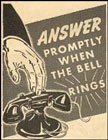Newspapers were the daily, bi-weekly, or weekly deliverer of news. Magazines published on a periodic basis informed readers of the state of affairs at home and abroad and provided stories and articles for entertainment.
Radio was an instant source of news for those fortunate enough to have the receivers. In addition to the Canadian Broadcasting Corporation run by the government, there were many private stations that played popular music and carried local programming. Getting together around the radio set was often the focus of an evening at home.
Movies from Hollywood were shown at all Canadian theatres. In Summerside, a movie would typically be at The Capitol on Central Street for a three or four day stretch. Often the theme was war-related, featuring famous actors as American military men. Almost always, short films of a patriotic nature preceded the movie. A sampling of the promotional ads for movies is attached for your entertainment.
Business correspondence and government letters were written on typewriters. The average citizen wrote letters by hand and visited the Post Office daily to send the latest one and pick up any incoming mail. Official or urgent news came by telegram through the local railway office.
 Naturally, people exchanged information in conversations. They also attended public meetings where discussions were held or where lectures or speeches were presented. Telephones had become a popular means of communication, but were not yet in every home.
Naturally, people exchanged information in conversations. They also attended public meetings where discussions were held or where lectures or speeches were presented. Telephones had become a popular means of communication, but were not yet in every home. For the purpose of this website the very general theme of communication has been broken into the following sections: Newspapers, Letters and telegrams, and Radio.
| Related Articles | Related Images | Related Memories | Related Websites | Inflation Calculator |
| Home Page | Site Map | Contact Us | Wyatt Heritage Properties |




